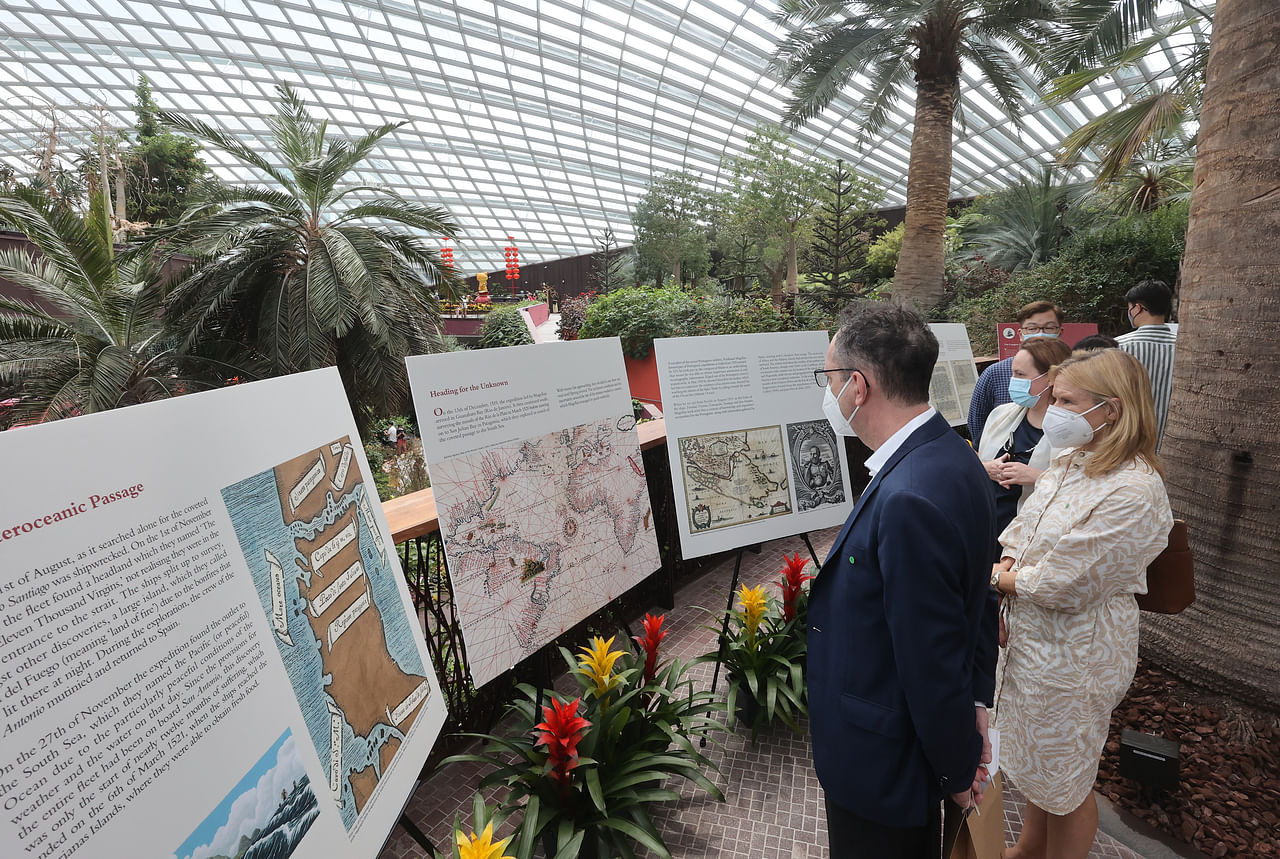500 years after Magellan's journey around the world, Gardens by the Bay exhibition retells story
Sign up now: Get ST's newsletters delivered to your inbox
SINGAPORE - Bitter rivals 500 years ago, Spain and Portugal on Friday (Feb 4) came together at an unlikely place to celebrate their joint legacy.
At Singapore's Gardens by the Bay, the two embassies marked half a millennium since Portuguese explorer Ferdinand Magellan led the first successful voyage around the globe, which precipitated a new age of globalisation and forced Europeans to reconsider their place in the world.
Setting off from Seville in Spain in 1519, the expedition consisted of a 270-man crew and five ships, but only 18 people and one ship would return to Spain three years later. Magellan himself did not survive.
"Globalisation as a concept did not begin with the explosion of communications and the Internet," said the Ambassador of Chile to Singapore Ignacio Concha, whose embassy was involved in opening a new Magellan exhibition at Gardens by the Bay's Flower Dome on Friday.
"It was founded in the minds of those who pushed for trade and worked in the East. With this exhibition, we pay tribute to these visionary men."
Sponsored by the Spanish monarchy, the three-year voyage was spurred by the need for Spain to find a western route to the lucrative trade in the Spice Islands, present-day Maluku Islands in Indonesia, with the traditional eastern route dominated by the Portuguese and disrupted by the Ottoman Empire.
Italian Christopher Columbus' adventures across the Atlantic Ocean decades earlier had stopped at the Americas. But Magellan pushed farther, locating a strait in southern Chile that allowed his crew to venture into the Pacific Ocean.
The strait is now named after him, but the expedition has taken on far greater significance. By showing that one could return to Spain by sailing consistently west, it put paid to ideas that the earth was flat.
The people of various habits and religions that they met along the way also challenged Euro-Christian views of the world, in some quarters sparking an undercurrent of relativism that was to consistently challenge ideas of European supremacy and moral righteousness.
The exhibition, Encounter Between Three Worlds: 500 Years After The First Circumnavigation Of The Earth, consists of text panels and images of maps, and runs for two weeks until Feb 13.
It chooses to focus on the heroism of the explorers, ignoring the links between European exploration and more intensive colonialism.
Magellan died during a battle in the Philippines, killed by a poison arrow on the island of Mactan during a skirmish.
The ship that returned was captained by Spanish navigator Juan Sebastian Elcano, who took part in a mutiny against Magellan when he was still struggling to locate the strait.

CMG20220204-ThongKH01唐家鸿/刘一泽/Launch of Encounter Between Three Worlds: 500 Years After the First Circumnavigation of the Earth [Garden by the Bay, Flower Dome]
PHOTO: CMG
Speaking at the opening, Second Minister for Education and Foreign Affairs Maliki Osman said Magellan's feats are a reminder that Singapore must inspire curiosity and instil confidence in its students, so that they, too, can venture into uncharted waters.
"To act upon our curiosity, we need confidence. Confidence to try and sometimes even fail. Discovery begins when we challenge long-held assumptions and limitations," he added.
The voyage was also a precursor to how interconnected the world would become. Despite the vast distances separating Singapore from Spain, Portugal and Chile, the Republic enjoys strong bilateral relations with each, he said.
National parks experts from Portugal and Singapore are working together to facilitate a tree exchange, involving a yellow flame tree from Singapore and an olive tree from Portugal.
"Just as Magellan's expedition explored new frontiers, so must our relationships," said Dr Maliki.
Gardens by the Bay chief executive Felix Loh likewise lauded the "daring vision, ingenuity and drive" behind the Magellan voyage, adding that Gardens by the Bay has a Mediterranean fuchsia named after the explorer in its Flower Dome.
"Many may know that some of the most sought-after species in Singapore's current house-plant craze are from the Americas, like Philodendrons and Monstera," he said.
"But it may surprise some of us that what we consider to be 'traditional' Asian foods use key ingredients from non-native plants. Where would our well-loved curries and sambals be without the chillies that are native to the Americas?"
Visitors must pay $12 for entry to the Flower Dome.


